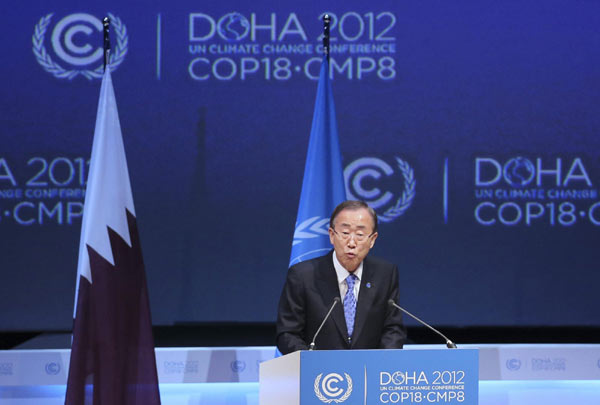Doha climate talks reach weak commitment by rich nations
Updated: 2012-12-09 14:01
(Xinhua)
|
||||||||
DOHA - United Nations climate talks in Doha on Saturday adopted a package of drafts of low-ambitious second period of Kyoto Protocol and weak commitment on climate finance after overnight negotiations over differences between developed and developing countries.
The closure of the two-week meeting in the Qatari capital was delayed for a whole day as diplomats from more than 190 countries pressed for any small progress that can be reached.
The conference president Abdullah bin Hamad al-Atiiyah said the agreement on the Kyoto Protocol would apply from 2013 till 2020. The treaty is the only UN plan that obliges developed nations to cut carbon emissions. Its first commitment period expires by the end of the year.
But Russian delegate Oleg Shamanov said that Russia, along with Belarus and Ukraine, opposed the decision to extend the Kyoto Protocol beyond 2012 and noted it retained the right to appeal the president's action.
The treaty is a vital step towards a new global UN deal to be agreed upon in 2015 and to enter into force from 2020.
The European Union-led group including Australia pledged to join the second period of the Kyoto Protocol, while the United States, Japan, Canada and Russia, among others, insisted on keeping away from the treaty despite international criticism.
No tougher emission reduction goals were announced by the developed countries in Doha, the Qatari capital, although they were urged to cut greenhouse gas emissions by at least 25 percent to 40 percent below 1990 by 2020.
The EU sticks to its target of 20 percent reduction, reiterating that a further step to 30 percent would require other developed countries' commitment to comparable emission reductions. Its bargaining position was weakened because it has reportedly met its targets of 20 percent eight years ahead of time and has no plans to put more ambitious cuts on the table.
More disappointingly, the United States said it could only cut its greenhouse gas emissions by 17 percent by 2020 from 2005 levels, which corresponds to a cut of 3 percent to 4 percent below the 1990 levels. Australia proposed a 0.5 percent emission cut from 1990.
The meeting requested developed countries to submit information by 2014 about their progress towards achieving quantified emission limitation and the potential for increasing ambition.
The EU, Australia, Japan, Liechtenstein, Monaco, Norway and Switzerland made their respective political declarations that they will not purchase the assigned amount units (AAUs) carried over from the first commitment period.
Greenhouse gas emissions are set to rise 2.6 percent this year, and are more than 50 percent higher than in 1990.
"We see the agreement of KP (Kyoto Protocol) second commitment period, this is our main objective this is our key success," said the Brazilian delegate. "The Kyoto protocol is more than a document. It expressed the conviction that climate change demands a rules-based approach. The KP is the standard of environment integrity, even for those parties who decide not to join it or to leave it."
- 'Weak' pledges on climate change
- Climate change responsibilities
- China backs developing states to combat climate change
- Beijing vows more aid for climate change
- Climate change responsibilities
- Beijing vows more aid for climate change
- Welcome to 'real world' of climate change
- Activists march to demand action on climate change
- Ban attends UN climate change conference in Doha
- China responsible in combating climate change

 Relief reaches isolated village
Relief reaches isolated village
 Rainfall poses new threats to quake-hit region
Rainfall poses new threats to quake-hit region
 Funerals begin for Boston bombing victims
Funerals begin for Boston bombing victims
 Quake takeaway from China's Air Force
Quake takeaway from China's Air Force
 Obama celebrates young inventors at science fair
Obama celebrates young inventors at science fair
 Earth Day marked around the world
Earth Day marked around the world
 Volunteer team helping students find sense of normalcy
Volunteer team helping students find sense of normalcy
 Ethnic groups quick to join rescue efforts
Ethnic groups quick to join rescue efforts
Most Viewed
Editor's Picks

|

|

|

|

|

|
Today's Top News
Health new priority for quake zone
Xi meets US top military officer
Japan's boats driven out of Diaoyu
China mulls online shopping legislation
Bird flu death toll rises to 22
Putin appoints new ambassador to China
Japanese ships blocked from Diaoyu Islands
Inspired by Guan, more Chinese pick up golf
US Weekly

|

|







